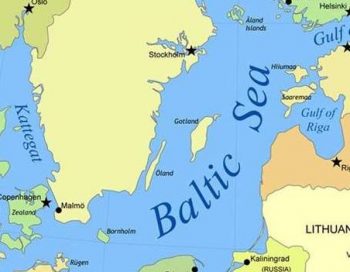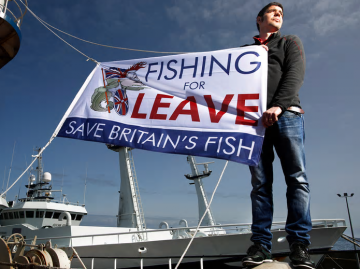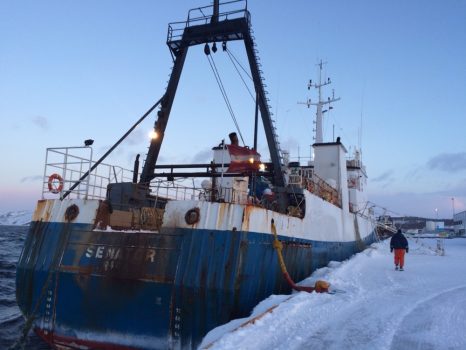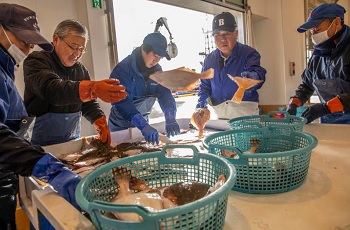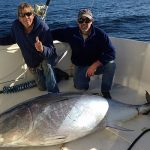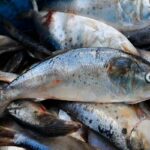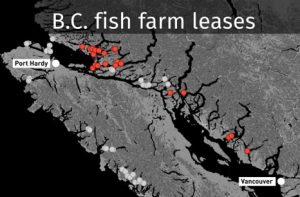Tag Archives: European Union
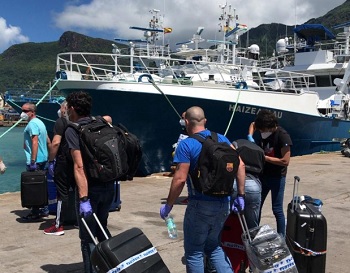
Stranded at Sea in The Time of Coronavirus
Spanish fisherman Josu Bilbao boarded a Qatar Airways flight headed for the Seychelles in January, just as he had done for the past 15 years. Ahead of him, four uninterrupted months of hauling tuna out of the glistening Indian Ocean. As it turned out, catching the fish was the least of the problems for the 56-year-old captain of Albatun Tres, one of the world’s largest tuna fishing boats. The coronavirus then swept the world, countries shut borders, planes stopped flying and Spain became one of the countries worst hit by the virus. Bilbao and his crew were stuck. As the Indian Ocean fleet shift was extended ship owners tried to figure out a way to get workers home. Aboard the ship avoiding infection became the priority. >click to read< 09:43
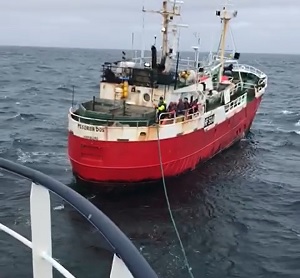
Fishermen post shocking video footage of ‘intolerable’ behaviour
Fishermen have described the conduct of Spanish gill-netters to the northwest of Shetland as “intolerable” after video footage was posted on social media showing a Spanish gill-netter allegedly attempting to run a rope through the propeller of a local whitefish trawler. This latest video evidence takes the ongoing skirmishes over access to fishing grounds to a new level and highlights why the local fishing industry is so keen to leave the European Union, and with it the Common Fisheries Policy (CFP). The battle between Spanish gill-netters and local trawler men has been ongoing for a long time with most local whitefish boats reporting over the years that they have been at the receiving end of attempts to drive them out of their traditional fishing grounds. >Video, click to read< 14:46
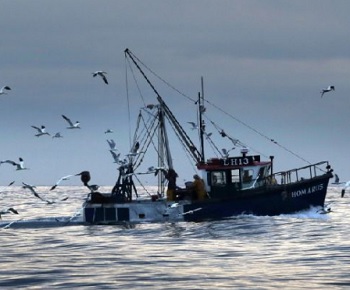
‘Leave the diplomats out’ and put fishermen in charge of Brexit talks
As the UK and EU teams begin their final round of negotiations this week, Pascal Lamy called for “the politics and legal complexities” to be taken out of the fisheries talks, which are at an impasse. The UK team has accused the EU of not “accepting the reality” that Britain will be an independent coastal state at the end of the year, while the EU’s chief negotiator, Michel Barnier, has rejected UK proposals for annual negotiations on quotas, saying EU fishermen needed “predictability” in the form of continued “status quo” access to UK fishing grounds after Brexit. >click to read< 10:27
Irish fishermen warn of violent clashes with UK boats ‘Give us an agreement! – Irish fishing chiefs have warned of violent clashes with British boats if the European Union fails to reach an agreement for continued access to UK’s fishing waters. Killybegs Fishermen’s Organisation has claimed the industry would be plagued by thousands of job loses if Irish boats are locked out of the UK’s fishing grounds. >click to read< 10:35
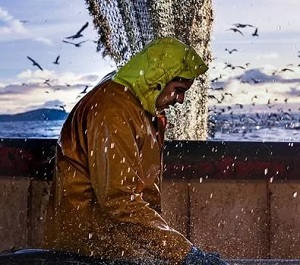
Distraught UK fishermen face wipe out over coronavirus and EU
The British fishing industry could be “wiped out” because of the coronavirus outbreak keeping fishermen from selling their products to the wider public. The British and Scottish Governments have both issued guidance and rolled out new policies in a bid to help the fishing industry survive the crisis but fishermen have warned their policies may not be enough. Scottish trawler Alistair Sinclair told the Today programme: “We don’t really know what is ahead of us. “There’s no light at the end of the tunnel. We may get to the point where boats are of little value. “Everything we’ve worked for through our life to get where we are today could be erased like rubber on a piece of paper.” >click to read< 07:21
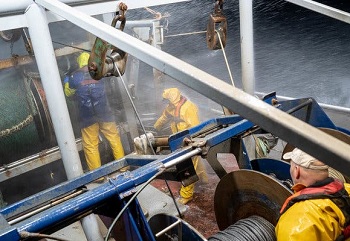
Fishing Presents a Vexing Snag in Brexit Talks
In the pitch black of early morning, huge waves hurled the 30-ton vessel from side to side, drenching crewmen who struggled to keep their footing as they cast the trawler’s nets into the swirling seas. But, once back on the bridge, the skipper, Dave Driver was oblivious to the stomach-churning motion of the boat, and dismissive of the perils of his work — even as he recalled once falling overboard and, on another occasion, rescuing two fishermen from drowning. “I’m my own boss, I do what I want, I think it’s the best job in the world,” said Mr. Driver, who left school at age 15, but now owns the 1.2 million pound trawler Girl Debra, named after his wife. He has only one major gripe in life: the French. photo’s, more, >click to read< 14:51

Top Gov Aide: Britain doesn’t need Farmers or Fishermen!
One of the most senior Government advisers has said the UK does not need its farming or fishing industries, according to reports. In comments seen by the Mail on Sunday, Dr Tim Leunig is understood to have said the food sector was ‘not critically important’ to the country’s economy, and that agriculture and fisheries ‘certainly isn’t’. The economic adviser to the Chancellor, in his leaked emails, is reported to have said ministers could follow the example of Singapore which is ‘rich without having its own agricultural sector’. >click to read< 13:34
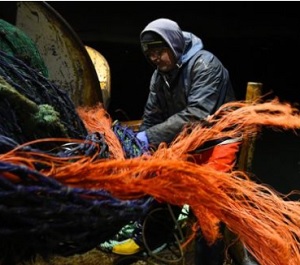
Battle lines being drawn over fishing rights
Fish have been served up among the main bones of contention between the UK government and the European Union. The negotiating mandate published on Thursday at Westminster is a long way from the vision for a future relationship for managing wild fish stocks in the European Commission’s proposals. That comes as no surprise to those who have seen the pre-negotiation posturing from the rhetoric of the 2016 Brexit campaign, to the priorities set out by Brussels along with the Withdrawal Agreement. >click to read< 23:13

Emmanuel admits Boris holds ‘fishing card’ but warns trade deal unlikely by end of this year
Emmanuel Macron has expressed doubt over a Brexit deal between the EU and UK by the end of 2020 because of debates over fishing.has expressed doubt over a Brexit deal between the EU and UK by the end of 2020 because of debates over fishing.has expressed doubt over a Brexit deal between the EU and UK by the end of 2020 because of debates over fishing.,, It is now down to Prime Minister, Boris Johnson, to negotiate a new trading relationship with the European Union, having already ruled out extending the implementation period. >click to read< 09:03
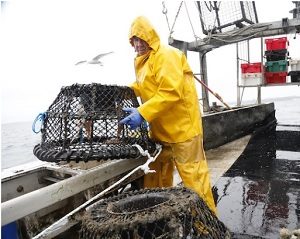
Will Brexit really bring victory for small scale fishermen or big business?
During the pre-referendum canvassing, Britain’s fishermen were held up by Leave advocates as an example of a ‘homegrown’ industry decimated by what they saw as ‘draconian’ EU regulations. Compliance with the EU’s Common Fisheries Policy, (that dictates that member states can’t control their own waters, nor set their own fishing quotas), was, they believed, the reason why. >click to read< 10:13

Brexit at last: Britain leaves the EU as champagne corks fly, Post-Brexit talks gear up for fish fight
The United Kingdom finally cast off from the European Union on Friday for an uncertain future, with Brexiteers claiming victory and popping champagne corks for an “independence day” they said marked a new era for the country.,, On the white cliffs of Dover, the message: “The UK has left the EU” was projected between a British and an EU flag. >click to read< 07:51
Post-Brexit talks gear up for fish fight between EU, UK – When it comes to U.K.-European Union relations, there’s nothing like slapping a fish around. After all, both sides have been contesting who rules their waves practically since the United Kingdom became a member in 1973. >click to read<
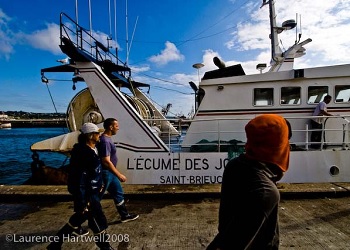
One day before Brexit and Breton fishermen fear the worst!
“Cataclysm”, “catastrophe”, “brothel without name” … Breton fishermen are on the warpath with the approach of Brexit, which could deprive them of a large part of their fish resources and create enormous tensions in the English Channel. “A Brexit without agreement for fishermen, it will be a real disaster. Their worst fear: a hard Brexit, without agreement with the United Kingdom, which would prohibit access to British waters overnight. “It would be a cataclysm,” recognizes Olivier Le Nezet, president of the Breton fisheries committee. >click to read< 21:38
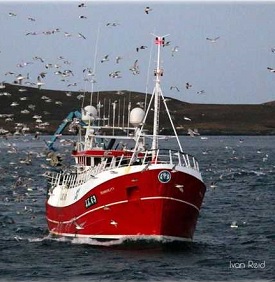
Brexit: Fishermen on high alert as EU trade talks loom
The UK is leaving the EU on Friday night after which both sides will get ready to talk about its future relationship with the aim to conclude these negotiations by the end of the year. Documents from the European Commission show that the EU’s negotiation position clearly aims for continuing with the status quo of reciprocal access to fishing waters and resources. Meanwhile the Irish Taoiseach Leo Varadkar is quoted as saying that access to UK waters must continue for EU fishing boats if the UK wants a trade deal on banking. >click to read< 11:19

Cornwall fishermen frustrated by Brexit surveillance changes
The Marine Management Organisation (MMO) is extending surveillance to “deter and detect illegal fishing by any vessels in English waters”. The extra checks are being done in port and at sea using boats and aircraft. Fishermen based in Newlyn, Cornwall said “we feel under so much scrutiny that people have given up”. The MMO said the changes would bring vessels under 10m in line with other fishing boats around the coastline. >click to read< 12:15

UK fishing town warns Boris Johnson over Brexit
Welsh fishmonger Lenny Walters has a warning for Prime Minister Boris Johnson as he celebrates his one-month anniversary in office on Saturday. If he goes back on his promise to deliver Brexit at any cost on October 31: “I think there will be riots.” “People are getting nasty,” the 67-year-old said while filleting monkfish with a razor-sharp knife. Locals see Johnson as their last great hope for reviving the local fishing industry. Their trust in his ability to do so is not terribly strong. “Do I have faith in Boris? I am not sure,” fish merchant Mark Davis said after a moment’s thought. >click to read< 16:09
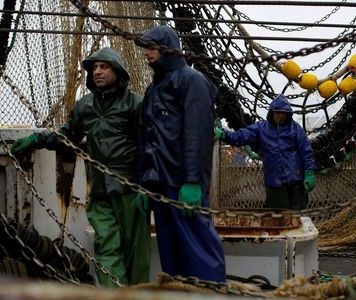
Danish fishing communities fear Brexit could sink them
In the small fishing town of Thyboron on the northwestern coast of Denmark, many fishermen worry the British waters they have become increasingly dependent on will be out of reach when Britain leaves the European Union.,,, Since the 1970s, EU fishermen have had access to British waters under a deal, that many in Britain saw as unfair. Now some see Brexit as a chance to “take back control” of their waters and keep foreign vessels out. “This town could end up closing down because of Brexit,” says fisherman Michael Bork, 36, who has been fishing since the age of 10. 31 images>click to read<10:40
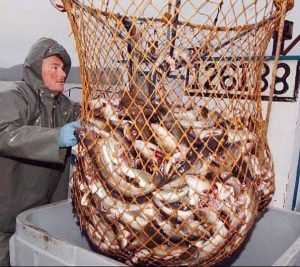
CETA and Atlantic Canada’s fishery: From international trade to the outport stage
As trade grows between Canada and the European Union (EU), the results of this international partnership are washing ashore in fishing outports across the province. The fishery, which was historically the economic foundation of Newfoundland and Labrador, is today an industry continuously beset by cuts, declines and uncertainties. But in recent years, words of hope and rebound are growing in the public discourse. With tariffs declining and opportunities arising, the Comprehensive Economic and Trade Agreement (CETA) between Canada and the EU has the potential to play a key role in the livelihoods of harvesters and processors. >click to read<11:12
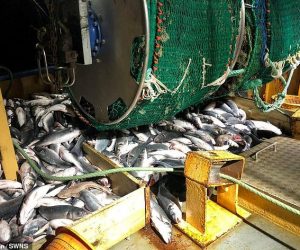
Wasteful Regulation: British fisherman throw two TONS of sea bass worth £20,000 back into the sea due to strict EU fishing quotas
This is the extraordinary moment a fisherman was forced to throw two tons of sea bass worth £20,000 back into the sea due to strict European Union fishing quotas. Joel Dunn, 32, recorded one of his crew plucking sea bass from the huge catch and hurling them one by one back into the waters after accidentally catching the fish as part of their haul. EU rules designed to protect sea bass from over-fishing mean catches with more than three per cent sea bass must be put back. >click to read<08:16
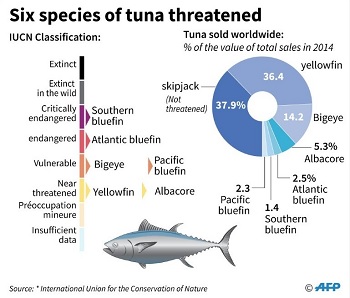
Fisheries nations to decide fate of declining bigeye tuna
Dozens of nations with commercial fisheries in the Atlantic Ocean will grapple next week with a new finding that bigeye tuna, the backbone of a billion dollar business, is severely depleted and overfished.,,, An internal report by 40-odd scientists working under the inter-governmental International Commission for the Conservation of Atlantic Tunas (ICCAT), finalised last week, shows that populations have fallen to less than 20 percent of their historic levels. Even more critical, the stock is barely half the size needed to support a “maximum sustainable yield”—the largest catch that can be taken without compromising long-term stability of the species. Current harvests, overwhelmingly legal, are also more than 60 percent above levels that would give bigeye at least a fighting chance of recovering its numbers, the report said. >click to read<15:46
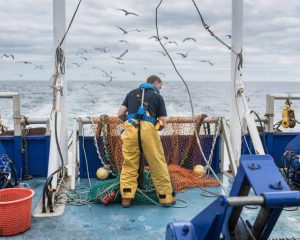
UK set to back down over fishing quotas during Brexit transition
The UK government has accepted that British fishermen will not enjoy a larger share of the fish available to be caught in domestic waters during the post-Brexit transition period. Michael Gove, environment secretary, has called for an immediate renegotiation of fishing quotas and access for EU vessels in British waters from March 2019, when the UK will leave the bloc. But the British government is set to accept on Monday demands set out in the EU’s draft transition text, which includes a clause making clear that the UK share of the “total catch” will remain unchanged during the two years after the UK leaves the EU. >click to read<11:44
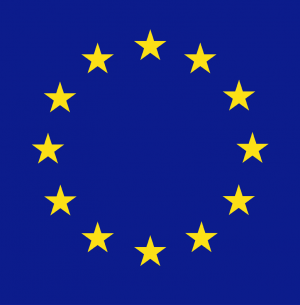
EU prepares Canada-style Brexit deal for UK
The EU is preparing to present Britain with a skeleton, Canada-style trade deal by the early summer if the UK is unable to clarify its demands and remains in Brexit La-La land, according to senior European officials. The fallback plan considered by Brexit negotiators underlines the concern in Brussels, Berlin and Paris over Theresa Mays approach to future relations, which they fear will be too muddled to allow for meaningful negotiations. click here to read the story 13:55
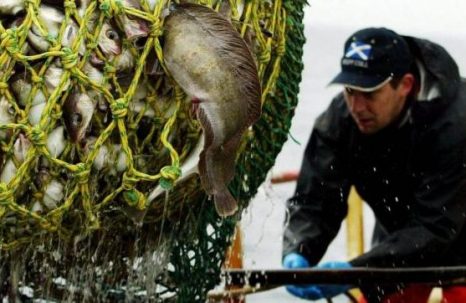
Minister calls for clarity on post-Brexit fishing industry ahead of crunch talks
The UK Government is being urged to “come clean” on its plans for the fishing industry after Brexit as ministers prepare for “difficult” quota talks. Holyrood Rural Economy Secretary Fergus Ewing said all parties must work together in the run-up to crucial European fishing talks in December. He claimed uncertainty over what will happen when the UK leaves the European Union was being compounded by “confusion” from the UK Government over any transition period. The talks in Edinburgh on Friday, which also include representatives from the Welsh and Northern Irish administrations, are “an opportunity to show we are all fully focused on the needs and interests of our respective fishing industries,” he added. click here to read the story 18:32
Fishery Reform Post Brexit -New technology may allow regulation by effort rather than quotas
 Among the few certainties of Brexit, one is that we will need a new, bespoke, British fisheries policy. The prime minister has confirmed that we will be leaving the Common Fisheries Policy. The fishing industry, though a small part of the economy, is highly symbolic, having been cheaply betrayed on entry into the European Union, when we donated to our EU partners the chance to fish a vast sea area. On leaving, Britain will control not only its 12-mile territorial waters, but also its 200-mile exclusive economic zone. This is a golden opportunity to learn from the management of fisheries around the world and design a system of exploiting our fish that is sustainable, conservationist and profitable. ITQ? or Days at Sea? click here to read the story 12:18
Among the few certainties of Brexit, one is that we will need a new, bespoke, British fisheries policy. The prime minister has confirmed that we will be leaving the Common Fisheries Policy. The fishing industry, though a small part of the economy, is highly symbolic, having been cheaply betrayed on entry into the European Union, when we donated to our EU partners the chance to fish a vast sea area. On leaving, Britain will control not only its 12-mile territorial waters, but also its 200-mile exclusive economic zone. This is a golden opportunity to learn from the management of fisheries around the world and design a system of exploiting our fish that is sustainable, conservationist and profitable. ITQ? or Days at Sea? click here to read the story 12:18
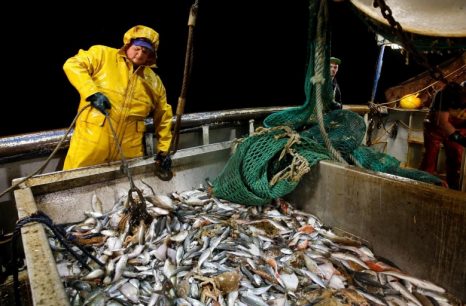
UK fishermen see Brexit bonanza, but there’s a catch
Newlyn – For the fishermen of this small port on the toe of England, Britain’s vote to leave the European Union was an answer to their prayers. After 45 years chafing under what they saw as unfair quotas in one of the world’s richest fishing grounds, the UK government would finally, in the lexicon of Brexiteers, “take back control” of British waters. But what Brexit gives with one hand, it can also take away. European fishermen want Brussels to use its trump card – continued access to the essential EU market – in negotiations on how to divvy up the seas. click here to read the story 12:15
CETA: Canada-European Union pact worries US lobster industry
 Members of the U.S. seafood industry are fearful that Canada’s approval of a new trade deal with the European Union will cause big problems for the American lobster business, just as the catch is hitting historic highs. The Canada-European Union Comprehensive Economic and Trade Agreement Implementation Act, or CETA, cleared its final hurdle in the Parliament of Canada on Tuesday. The deal gets rid of tariffs on Canadian lobster exports to the 28-nation bloc, putting Canada at a huge advantage over the U.S. click here to read the story 11:06
Members of the U.S. seafood industry are fearful that Canada’s approval of a new trade deal with the European Union will cause big problems for the American lobster business, just as the catch is hitting historic highs. The Canada-European Union Comprehensive Economic and Trade Agreement Implementation Act, or CETA, cleared its final hurdle in the Parliament of Canada on Tuesday. The deal gets rid of tariffs on Canadian lobster exports to the 28-nation bloc, putting Canada at a huge advantage over the U.S. click here to read the story 11:06
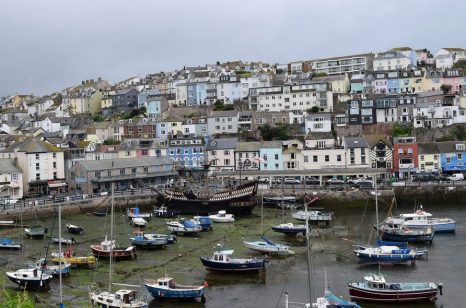
Brexit Hopes Fade for Some Who Want It So Badly
The faded Welsh industrial port of Milford Haven and the picturesque English harbor town of Brixham are economic worlds apart, but they’re both desperate to leave the European Union. Locals say Brexit can boost their fishing industry, hit by competition from foreign fleets and quotas on catches during 44 years of EU membership. The worry is that the country will repeat the mistakes on the way out they say were made on the way in by ceding to too many European demands. What they don’t want is to end up with access to more fish, though fewer markets. “There’s a lot of bargaining and we need to come down hard and do something about it,” said Mark Albery, 43, who catches lobster, crab and whelk in the waters off Milford Haven on Wales’s southwestern tip. A fisherman since he was a teenager, he’s not optimistic over a favorable deal. “Not with this country, no, not at all. We just do what we’re told in the end.” click here to read the story 15:32
The EU is making poor countries poorer
 The EU likes to present itself as a global force for good, fostering aid and development in the world’s poorest societies. It boasts of its £12 billion aid programme, and calls itself “the most generous donor in the world”. It truly believes itself to be a kindlier world power than the United States, Russia, or China. As ever with the EU, the truth is much uglier. Eurosceptics have long known of the EU’s practice of dumping subsidised agricultural products on developing countries, especially Africa. In a rare case of progress, the EU now spends considerably less on these, and WTO members – including the EU – finally agreed to end export subsidies in 2015.,,, The EU also harms local fishing industries. Having instituted rigorous fishing quotas in Europe, the EU makes deals with various West African countries to allow its large trawlers to fish on a massive scale in those countries’ waters. click here to read the story 13:36
The EU likes to present itself as a global force for good, fostering aid and development in the world’s poorest societies. It boasts of its £12 billion aid programme, and calls itself “the most generous donor in the world”. It truly believes itself to be a kindlier world power than the United States, Russia, or China. As ever with the EU, the truth is much uglier. Eurosceptics have long known of the EU’s practice of dumping subsidised agricultural products on developing countries, especially Africa. In a rare case of progress, the EU now spends considerably less on these, and WTO members – including the EU – finally agreed to end export subsidies in 2015.,,, The EU also harms local fishing industries. Having instituted rigorous fishing quotas in Europe, the EU makes deals with various West African countries to allow its large trawlers to fish on a massive scale in those countries’ waters. click here to read the story 13:36
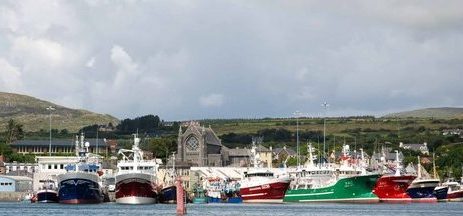
Ireland in danger of losing 30 more fishing vessels with the loss of an estimated 360 jobs say South West fishermen
There have been a lot of the same repeated statements about the rights of 23 RSW Pelagic vessels who have 40% of the €275,317,000 total earnings of Irelands fishing fleet, an estimated 100 million Euro in 2016 increasing to 110 million in 2017. Reports across various media have communicated a message that a Mackerel war has started between North and South. Nothing could be further from the truth. It is amazing to me personally how people’s perception can override the facts but the human brain is an extraordinary muscle. To give a little background on recent events, the Irish South & West Fish Producers Organisation and our colleagues in the fishing Industry were informed by Senior officials in the Department of Marine in early 2016 that our tiny fishing fleet is still too big for our nations meagre fish allocations from the European Union in predominantly our waters that produce some 30% of all fish landed in Europe. We were told that cuts were required to be made to the Whitefish fleet of 30 boats measuring between 12 – 23 Meters. Click here to read the story 09:28






